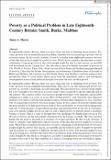Poverty as a political problem in late eighteenth-century Britain : Smith, Burke, Malthus
Abstract
In eighteenth-century Britain, there was more than one way of thinking about poverty. For some, poverty was an essentially moral problem. Another way of conceiving of poverty was in economic terms. In this article, however, I want to consider some eighteenth-century versions of the idea that poverty might be a political issue. What I have in mind is the idea that a society containing a large proportion of very poor people might be, just for that reason, an unstable and disordered society. I argue, first, that this idea is central to Smith's treatment of poverty in The Wealth of Nations. Then, after a brief account of how Paine and Godwin imagined the end of poverty, I describe the further development and refinement of Smithian lines of thought in Burke and Malthus. My conclusion is that Smith, Burke, and Malthus constitute evidence that present-day ideas of social justice derive more from the nineteenth century and subsequent developments in moral and political thought than from the early modern period.
Citation
Harris , J A 2023 , ' Poverty as a political problem in late eighteenth-century Britain : Smith, Burke, Malthus ' , The Southern Journal of Philosophy , vol. 61 , no. 1 , pp. 63-81 . https://doi.org/10.1111/sjp.12501
Publication
The Southern Journal of Philosophy
Status
Peer reviewed
ISSN
0038-4283Type
Journal article
Collections
Items in the St Andrews Research Repository are protected by copyright, with all rights reserved, unless otherwise indicated.

